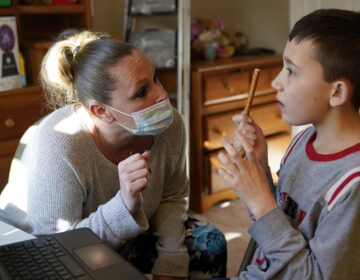Pa. DHS lags on efforts to provide residential treatment for mentally ill defendants
The state has fallen behind on federal court settlements requiring it to provide residential psychiatric treatment to those deemed incompetent to stand trial.

A plan to add beds for prisoners in need of mental health treatment to Building 10 at Norristown State Hospital has been halted. (Emma Lee/WHYY)
For the second time in two years, the Pennsylvania Department of Human Services has fallen behind on federal court settlements requiring it to provide residential psychiatric treatment for those deemed incompetent to stand trial.
This time, residents and concerned officials in Norristown intervened against a plan to add 50 beds to the state hospital in the Montgomery County borough by Dec. 15.
DHS halted construction on Norristown State Hospital and negotiated a new deadline of Jan. 5 with attorneys representing plaintiffs in the settlement.
“We are committed to finding a solution that addresses the needs of the community, as well as DHS’s obligation to ensure that all individuals in the criminal justice system who need mental health treatment have access to necessary treatment in the most appropriate setting,” said materials presented by DHS at a subsequent community meeting in Norristown.
That solution — and the future of the 137-year-old psychiatric facility — remains murky.
At the beginning of the year, then-Human Services Secretary Ted Dallas announced the state would close portions of two psychiatric hospitals, including Norristown’s. Borough officials have expressed interest in redeveloping the property after it leaves public use. Those plans have been challenged by two separate class-action settlements over Pennsylvania’s failure to provide treatment for “forensic” patients, the name given to people funneled into these facilities from the criminal justice system. State officials had planned to use some of the space that would be closed to house these forensic patients, prompting pushback from some local residents.
For those working on behalf of patients in the prison system, the delays have been frustrating.
My clients “sit in jail cells and just rot away until somebody finds room for them, for more than a year,” said Witold Walczak, legal director with the American Civil Liberties Union of Pennsylvania. The waiting list for a bed at Norristown State Hospital is currently around 14 months, though federal courts have said more than seven days is unconstitutional, according to Walczak.
Once defendants get a bed at a state facility, they receive medication or education about the criminal justice system in order to make them fit to stand trial and participate in their own defense.
Missing previous deadlines set by the first settlement in 2015 prompted new legal action and the second settlement. The state faces steep fines if it is does not move quickly to fulfill the terms of the new settlement.
The state has made good on parts of that agreement, opening up more than 100 new forensic beds. However, the list of people in county prisons who need psychiatric treatment continues to grow. Norristown receives forensic patients from 19 counties in the eastern part of the state. The Torrance State Hospital receives clients from the rest of Pennsylvania.
During that Nov. 30 community meeting in Norristown, DHS officials offered a compromise: add the 50 beds in Norristown now, with the pledge to move them elsewhere by 2022. The agency is moving forward and “remains hopeful” it will hit its new Jan. 5 deadline, according to a written statement from director of communications, Kait Gillis.
“Whether 50 or 60 beds go online Dec. 15 or Jan. 5 isn’t going to make a big difference, given the huge scope of the problem,” said Walczak. “But, if something happens and the state says we’re not opening these beds, we’re in court immediately.”
WHYY is your source for fact-based, in-depth journalism and information. As a nonprofit organization, we rely on financial support from readers like you. Please give today.



